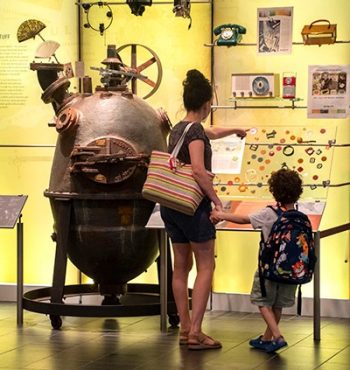FOR IMMEDIATE RELEASE

WASHINGTON, June 6, 2023 — The Science History Institute preserves and interprets the history of chemistry, engineering and the life sciences. During a June 10 ceremony in Philadelphia, the American Chemical Society (ACS) will designate the Institute as a National Historic Chemical Landmark.
“The Institute is significant because it gathers and shares stories of the innovators and scientific discoveries that affect our daily lives,” says ACS President Judith C. Giordan, who will speak at the dedication ceremony. “Its collections and programs help the public and scholars understand the role of science and technology in shaping society’s past, present and future.”
The Institute was founded as the Center for History of Chemistry, which opened in 1982 on the University of Pennsylvania campus, with support from the university and ACS. The American Institute of Chemical Engineers became an additional sponsor in 1984. The organization was renamed the Chemical Heritage Foundation in 1992 and moved to its present site in Old City, Philadelphia, in 1996. After merging with the Life Sciences Foundation, it was renamed the Science History Institute in 2018, reflecting its broad interdisciplinary mission.
The Institute includes the Othmer Library of Chemical History, the Beckman Center for the History of Chemistry, Distillations magazine and podcast, an award-winning museum, an oral history center and digital offerings. Its collections include print books, the personal papers of numerous Nobel laureates, scientific equipment, photos and films, digital resources, fine art, and oral history interviews. Through these resources, as well as live and virtual events, the Institute makes the history of science accessible to the public and to researchers.
###
The American Chemical Society (ACS) is a nonprofit organization chartered by the U.S. Congress. ACS’ mission is to advance the broader chemistry enterprise and its practitioners for the benefit of Earth and all its people. The Society is a global leader in promoting excellence in science education and providing access to chemistry-related information and research through its multiple research solutions, peer-reviewed journals, scientific conferences, eBooks and weekly news periodical Chemical & Engineering News. ACS journals are among the most cited, most trusted and most read within the scientific literature; however, ACS itself does not conduct chemical research. As a leader in scientific information solutions, its CAS division partners with global innovators to accelerate breakthroughs by curating, connecting and analyzing the world’s scientific knowledge. ACS’ main offices are in Washington, D.C., and Columbus, Ohio.
ACS established the National Historic Chemical Landmarks program in 1992 to recognize seminal events in the history of chemistry and to increase awareness of the contributions of chemistry to society. Past Landmarks include the invention of Polaroid instant photography, the discovery and production of penicillin, the invention of synthetic plastics, and the works of such notable scientific figures as educator George Washington Carver and environmentalist Rachel Carson. For more information, visit www.acs.org/landmarks.
To automatically receive press releases from the American Chemical Society, contact newsroom@acs.org.
Note: ACS does not conduct research, but publishes and publicizes peer-reviewed scientific studies.

